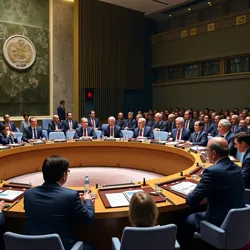United Nations Involvement in the Second American Civil War
The United Nations played a complex and often controversial role during the Second American Civil War (2030-2038), serving as both a vital mediator and a reflection of the broader international tensions that the conflict generated. The organization's involvement was complicated by the unprecedented situation of having one of its founding members and permanent Security Council members descend into civil war, while simultaneously trying to maintain global stability during multiple concurrent international crises.
Early Response and Recognition Crisis
The Constitutional Crisis of 2029 initially presented the UN with a diplomatic challenge as multiple factions claimed legitimate authority over the United States' permanent Security Council seat. The Democratic-led Federal Continuity Government (FCG) maintained control of the US Mission to the UN in New York, though this control was frequently challenged by other factions. The international community largely recognized the FCG's authority in UN proceedings, primarily due to its control of the majority of America's nuclear arsenal and its occupation of key diplomatic facilities.
 The United Nations General Assembly Emergency Special Session on the American Crisis, December 2031
The United Nations General Assembly Emergency Special Session on the American Crisis, December 2031The early phase of UN involvement focused on humanitarian concerns and preventing the internationalization of the conflict. Secretary-General Miguel Torres-Sanchez's "Three Points for Peace" initiative in early 2031 called for maintaining humanitarian access, protecting civilian populations, and preventing foreign military intervention. However, these efforts were complicated by the January 2030 Emergency Powers Act, which had created competing claims to federal authority.
Relocation to Geneva
The deteriorating security situation in New York City led to the historic decision to temporarily relocate UN headquarters to Geneva in March 2033. The UN Emergency Relocation Protocol was activated following several security breaches at the New York headquarters and increasing concerns about the safety of diplomatic personnel. This marked the first time in UN history that the organization was forced to abandon its permanent headquarters due to security concerns in its host nation.
The relocation process, while logistically challenging, provided the UN with a more neutral position from which to address the American crisis. The Geneva Protocol of 2033 established new procedures for handling diplomatic representation from fragmented member states, which would later prove influential in managing other civil conflicts.
Security Council Dynamics
The UN Security Council's response to the Second American Civil War was marked by deep divisions among its permanent members. The British and French governments generally supported the FCG's position, while Russia and China pursued policies that often aligned with their regional interests within the fragmenting United States. This dynamic was particularly evident during the Nuclear August of 2035, when Russian and Chinese vetoes prevented stronger UN intervention following the Washington D.C. nuclear detonation.
The UN Emergency Response Protocol of 2035 represented a compromise between competing Security Council interests, establishing humanitarian corridors while avoiding direct military intervention. This arrangement allowed for international humanitarian access while preserving the major powers' ability to maintain their influence with their preferred American factions.
Humanitarian Operations
The United Nations High Commissioner for Refugees (UNHCR) coordinated the largest humanitarian operation in the organization's history during the conflict. The Global Refugee Response Framework was established to manage the unprecedented flow of American refugees to neighboring countries and across the globe. UN agencies worked closely with international partners to establish refugee processing centers in Canada, Mexico, and several Caribbean nations.
The World Health Organization (WHO) played a crucial role in preventing the spread of diseases in refugee camps and maintaining basic healthcare services in areas where medical infrastructure had collapsed. The organization's Emergency Medical Response Teams operated in 38 states during the height of the conflict.
Role in Peace Negotiations
The UN's most significant contribution came during the Denver Peace Conference of 2038, where it served as the primary mediating body. Secretary-General Torres-Sanchez's "Unified Approach" strategy brought together representatives from all major factions, international observers, and civil society organizations. The UN's neutral status and experience in post-conflict reconstruction proved crucial in achieving the eventual peace agreement.
The organization's Post-Conflict Reconstruction Unit worked closely with the incoming Fanning administration to implement the terms of the peace agreement and establish mechanisms for transitional justice. The UN Development Programme (UNDP) played a key role in coordinating international reconstruction efforts through the Marshall Plan II.
Criticisms and Legacy
The UN's handling of the Second American Civil War received both praise and criticism. Critics argued that the organization's initial reluctance to challenge the FCG's claim to the Security Council seat contributed to the conflict's escalation. The Accountability in Crisis Report of 2040 highlighted instances where UN peacekeeping forces failed to prevent atrocities, particularly during the early stages of the conflict.
However, supporters point to the successful humanitarian operations and the organization's crucial role in achieving peace. The experience led to significant reforms in UN procedures, including the creation of the Rapid Response to Internal Conflict Protocol and new guidelines for managing member state fragmentation.
See also
- UN Emergency Response Protocol
- Constitutional Crisis of 2029
- Denver Peace Conference of 2038
- Global Humanitarian Crisis Response
- International Peacekeeping Operations during the Second American Civil War
The UN's involvement in the Second American Civil War fundamentally transformed the organization's approach to internal member state conflicts and established new precedents for international intervention in civil wars. The lessons learned continue to influence UN operations and international crisis response protocols in the post-war era.